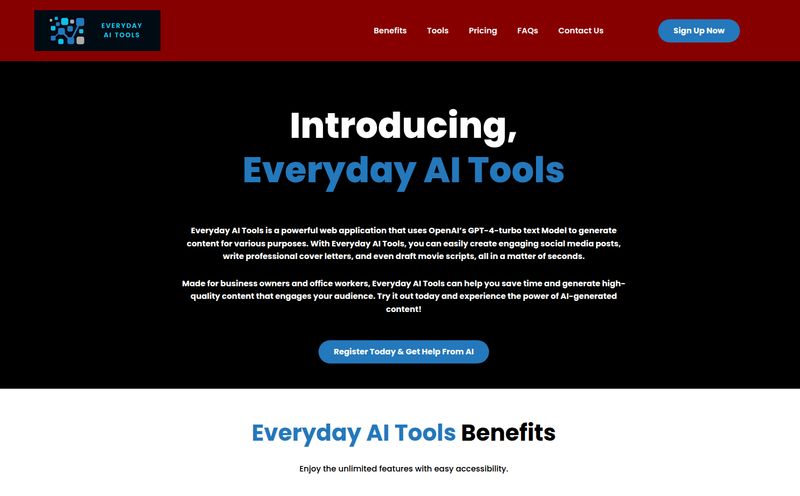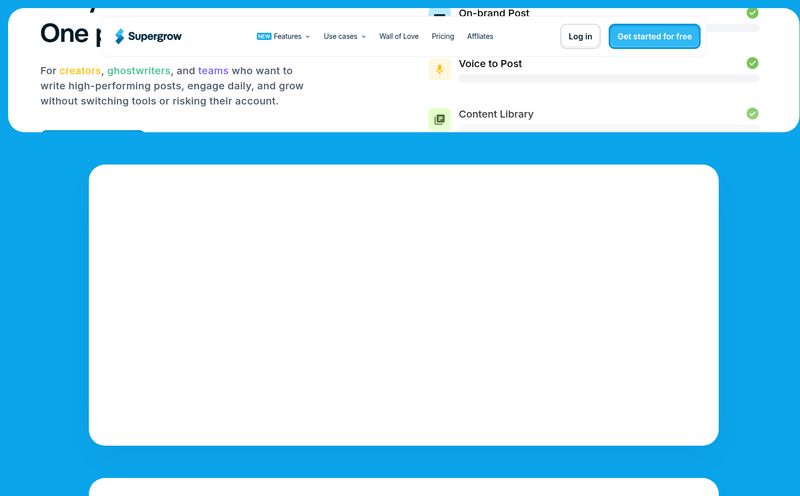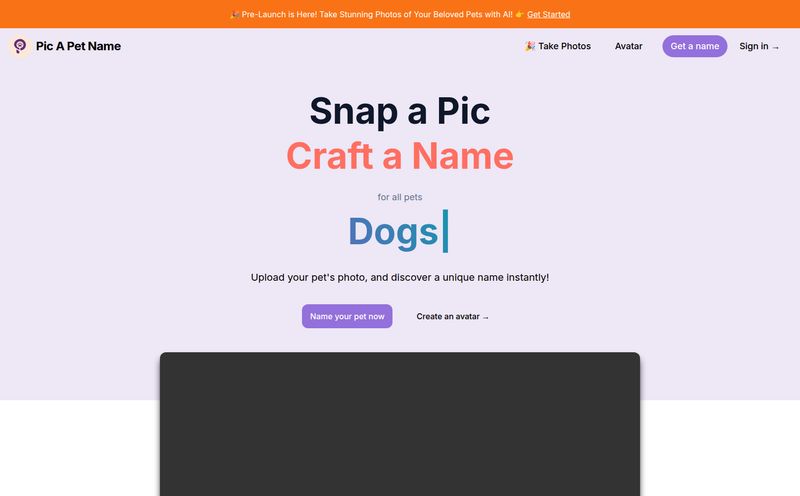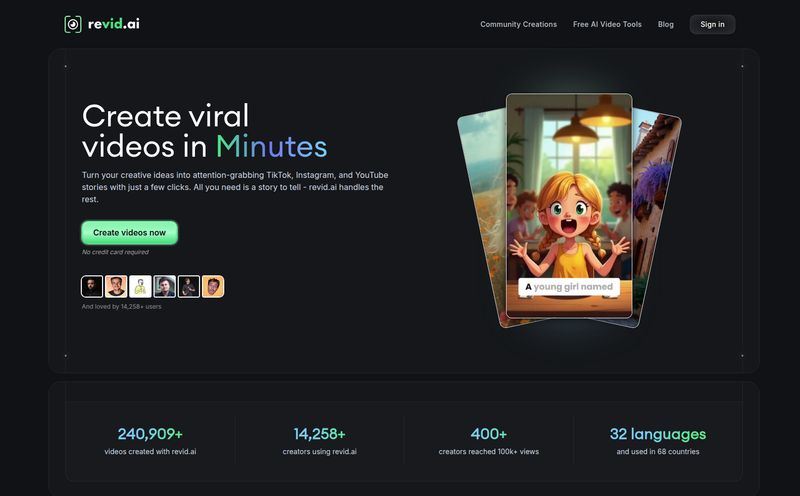You know, in this line of work, you see a lot of tools come and go. I spend half my day scrolling through Product Hunt and BetaList, and you start to see patterns—the meteoric rise and the quiet, unceremonious fade-out of tools that promise to change everything. It’s the digital circle of life in the SaaS jungle. And today, we're talking about one that seems to have become a ghost: CopyGen.
I was digging around for new AI-powered tools for ecommerce—specifically for the dropshipping crowd—and stumbled upon its name. The promise was alluring: an AI that writes your product and ad copy for you. Sounds great, right? A real time-saver. But when I went to check it out, I was greeted not by a slick landing page, but by a GoDaddy receipt waiting to be claimed.
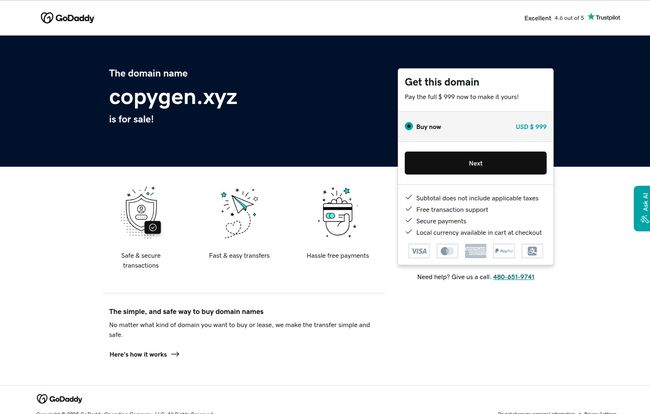
Visit CopyGen
Yep. The domain, copygen.xyz, is up for sale. For a cool $999, you can pick it up. This, my friends, is what we in the biz call a clue. It’s the digital equivalent of a “Closed” sign hanging crookedly on a dusty shop door. So, what was CopyGen? And what can its story teach us? Let's do a little digital archaeology.
What Was CopyGen Supposed to Be?
At its heart, CopyGen was designed to be a dropshipper's best friend. If you've ever tried to run a dropshipping store, you know the grind. You find a promising product on a site like Alibaba or Cj Dropshipping, but then comes the hard part: making it sound appealing. You have to write a compelling product title, an engaging description, snappy taglines, and then, you have to craft ad copy for Facebook, Google, or TikTok. It’s a mountain of writing.
CopyGen’s pitch was simple. You just feed it the product link from one of its supported wholesale websites, and its AI would spit out all that content for you. No more staring at a blank screen trying to find a new way to describe a silicone spatula. It was supposed to be the shortcut, the content-on-demand button for the modern reseller. A pretty compelling idea, I have to admit.
The Key Features That Caught My Eye
Looking at the specs and the chatter around it, two main features stood out as the core of the platform. They were the one-two punch aimed directly at the biggest time-sinks for ecommerce entrepreneurs.
Automated Product Copy Generation
This was the main event. The ability to take a sterile, often poorly translated product page from a wholesaler and transform it into something a real person would want to buy. I’ve spent countless hours rewriting supplier descriptions that read like they were put through a blender. The idea of automating that—generating product names, bullet points, and full-bodied descriptions—is genuinely exciting. It frees up the store owner to focus on marketing strategy, customer service, and all the other hats they have to wear.
Instant Ad Copy Creation
Beyond the product page, there's the relentless need for fresh ad copy. Your CPC and conversion rates depend on it. CopyGen claimed it could generate ad copy too, which would have been a massive help for testing campaigns. Imagine being able to spin up five different ad angles in seconds instead of minutes or hours. For anyone running paid traffic, that’s a powerful concept. It lowers the barrier to experimentation, which is how you find those winning campaigns that really scale a business.
The Good, The Bad, and The Missing
Every tool, even a phantom one, has its strong points and its weaknesses. From what I can gather, CopyGen was no different. Its a classic story of great potential meeting practical limitations.
The promise was obvious: speed and simplicity. For a solo dropshipper or a small team, automating copywriting is a game-changer. The support for major platforms like Alibaba and Cj Dropshipping was smart, as they are huge players in the space. It wasn't just a generic AI writer; it was built with a specific workflow in mind, which I always appreciate.
However, the cracks started to show pretty quickly. First, the lack of Aliexpress support is, frankly, baffling. For dropshippers, Aliexpress is the 800-pound gorilla. Not supporting it feels like opening a burger joint but refusing to sell french fries. It’s a major, almost fatal, oversight for your target audience. Another sticking point was that it was reportedly a desktop-only tool. In an age where people are running their businesses from their phones on a beach in Bali (or at least aspire to), being tethered to a laptop feels a bit old-fashioned.
And then there's the universal caveat of all AI: the quality of the output is directly tied to the quality of the input. If the original wholesale listing was sparse or vague, the AI-generated copy was likely to be the same. It's not magic; it's a machine that reworks existing information.
The Elephant in the Room: Where is CopyGen Now?
So we circle back to the GoDaddy listing. What happened? Did the founders get a better offer and get acqui-hired? Did they run out of funding? Or did they just realize the limitations—like the lack of Aliexpress support—were too big a hurdle to overcome?
My guess? It's likely a mix of things. The AI tool space is incredibly crowded. You’re not just competing with other specialized tools, you’re competing with giants like Jasper, Copy.ai, and even the built-in AI features now being rolled out by Shopify and other ecommerce platforms. Perhaps CopyGen was a brilliant idea that was just a little too late or a little too niche to gain critical mass. It's a tough market out there, and sometimes even a good idea isn't enough. It serves as a great lesson: a unique selling proposition needs to be truly unique and solve a problem better than anyone else.
Are There Alternatives to CopyGen?
Of course! The disappearance of one tool doesn't mean the problem it tried to solve has gone away. If you’re looking for AI to help with your product descriptions and ad copy, you have more options today than ever before. Here are a few I've personally used and can vouch for:
- Jasper (formerly Jarvis): This is one of the big players. It’s incredibly powerful and has a ton of templates for everything from product descriptions to Facebook ad headlines to blog posts. It’s more of a generalist tool, but its quality is top-notch. It's a subscription model, but for serious businesses, the ROI is there.
- Copy.ai: Another excellent and very popular option. I find its interface a bit more straightforward than Jasper's for beginners, and it also has a wide array of tools for ecommerce, social media, and more. It has a free tier, so you can try it out without any commitment.
- Shopify Magic: If you're on Shopify, you already have a powerful AI tool built right into your dashboard. With the click of a button, it can write or rewrite your product descriptions. It’s incredibly convenient, and since it’s part of your existing Shopify subscription, it doesn't cost extra. It's a no-brainer to try if you're on the platform.
While these tools might not have the one-click `URL-to-copy` feature that CopyGen promised, they are more robust, better supported, and, most importantly, they actually exist.
Frequently Asked Questions
- What was CopyGen?
- CopyGen was an AI-powered software tool designed to automatically generate product descriptions, taglines, and ad copy for resellers and dropshippers by using a link from a wholesale website.
- Who was CopyGen for?
- Its target audience was primarily ecommerce entrepreneurs, specifically those in the dropshipping and reselling business who needed to create a large volume of marketing copy quickly.
- Why can't I access CopyGen?
- The tool appears to be defunct. Its domain name, copygen.xyz, is currently listed for sale on GoDaddy, indicating that the service is no longer operational.
- Did CopyGen support Aliexpress?
- No, based on the available information, it did not support links from Aliexpress, which was considered a significant limitation for its target market of dropshippers.
- What are some good CopyGen alternatives?
- Excellent alternatives for AI copywriting include established platforms like Jasper and Copy.ai, or the built-in Shopify Magic feature if you are using the Shopify platform.
A Final Thought
The story of CopyGen is a fascinating little snapshot of the AI gold rush. It’s a reminder that a great idea is only the first step and that execution, market fit, and staying power are what truly matter. While CopyGen itself may have faded into the digital ether, the dream it represented—making the lives of entrepreneurs easier through smart automation—is stronger than ever. The tools just have different names now. So, pour one out for the tools that didn't make it, and then go check out the ones that did. Your business will thank you for it.
